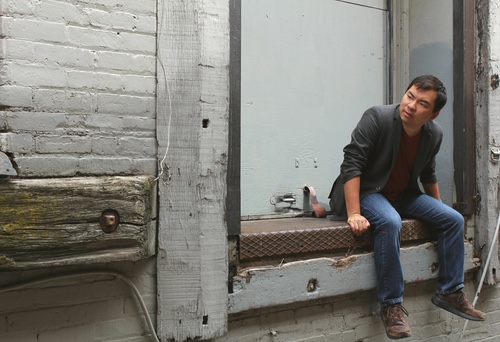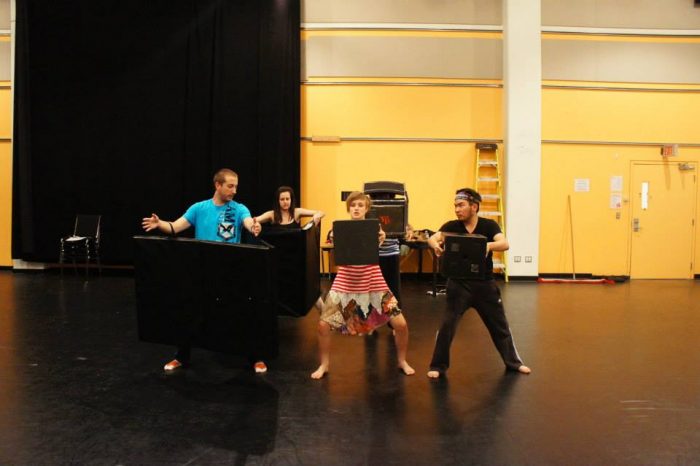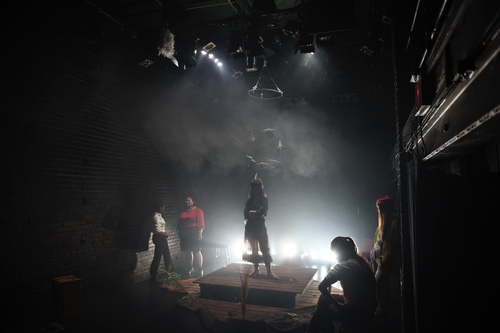4 Questions: Aaron Jan
This article is part of our series 50 Years of Disruption, in celebration of the Department of Theatre’s 50th Anniversary. In it, we’ll ask each participant four questions about themselves and their time at York.

1. Who are you?
I’m Aaron Jan (BA Theatre Studies 2015). I’m a Hamilton-born playwright, director and dramaturg. Since graduating, I’ve worked professionally as a creator with the Next Stage Theatre Festival, Canadian Stage, Tarragon Theatre, Factory Theatre, Fu-GEN Asian Canadian Theatre, Cahoots Theatre, Soulpepper and Native Earth Performing Arts. I’m probably best known for my work as a writer and director for Silk Bath Collective, whose next show, Yellow Rabbit is a part of Soulpepper’s 2018-2019 season! I can also make a highly edible potato salad.
My time at York was augmented with summers of directing and writing fringe plays in Toronto and Hamilton, where I was able to practically apply the skills I learned in my training. Following graduation, I was an invited to be an inaugural member of Factory Theatre’s Foremen Directing Program and am currently the dramaturgy intern at Cahoots Theatre (on a PTTP grant from Theatre Ontario).
I’m fascinated by stories that reposition individuals we consider to be villains as protagonists.
As a theatremaker, my current goal is to complexify the narratives of second and third generation Chinese Canadians. Perhaps this is a generalization, but I find that east Asian central characters in the theatre canon are usually typified as either these unyieldingly pure saints, or these dastardly evildoers. Our community rarely has an Eric Killmonger, a Hannah Schmitz or a Wily Loman – characters who we find morally degenerative, but also deeply empathize with.
My current work explores that moral gray area that the children of immigrants can occupy but is rarely spoken of.
2. What was your favourite moment during your time in the Theatre Department, and why?
In Judith Rudakoff’s THEA 3290 playwriting and new play dramaturgy class, one of the projects was to write a “myth” based on a personal experience that had changed us. Prior to this assignment, I was struggling in the class. I was under the impression that in order to be a successful playwright, I had to write “important” plays about “deep, emotional struggles” that would appeal to a “wide audience”. Hilariously, this meant that my work was general, vague and boring. I wasn’t enjoying the writing I was putting out because I had no emotional connection to it and was trying to impress the professor.
The myth project changed the way I wrote, because it was the first thing I had written that had something that fascinated me. In Judith’s 3290 class, we often talked about our creative obsessions as artists, the thing that keeps us up at night writing. Judith would often say that a good playwright could write plays that tackled the same creative obsession over and over again, and it would seem new and interesting every time. Re-inventing the wheel of form was pointless if you weren’t excited and obsessed with the content you were putting out.
The myth project awakened my creative obsession, and made me realize that my work couldn’t be anything but personal. It also made me remember why I wanted to do theatre in the first place. Whenever I’m dissatisfied with a project I’m working on, I always think back to that Myth project in 2013 and ask myself where I am in the work – where my fascination lies and why I’m dying to explore that world.
3. What comment, quotation, statement, or action that a professor—or classmate—offered had the greatest impact on you?
I have two!
#1 – In my second year devised theatre class, I was convinced that I was the best theatre maker there ever was. Previous to my time at york, I had been enrolled in a conservatory program, so I earnestly believed that I was the most mature, the best and the strongest artist in my year.
During one exercise, I described my classmates’ work as a clusterf****. My professor, LJ Nelles stopped the class and – instead of getting mad at me – asked me what I meant by that. As I explained my expletive, I realized that I was becoming an artist that I hated. Not only was I a complete jerk, but by letting me articulate what I actually felt, LJ helped me discover that what I was doing was wrong. There’s enough people who take up space in the industry and seeing the effect my words had on my classmates changed the way I collaborated and behaved as a theatremaker. I try to be generous when I work and ally myself with artists who create opportunities for others. We can’t do this alone, and I’m super grateful for LJ helping me realize that before it was too late.

#2 – In a second year theatre history course, we were studying the Gilbert and Sullivan’s the Mikado. Until that point in my life I had (thankfully) never experienced overt racism before or been in a situation where the colour of my skin was used against me. While the majority of my classmates found the show amusing, I found the studying of it as a “historic piece of theatre” as shocking and offensive – particularly the depiction of Asian men.
My professor, Marlis Schweitzer noticed that I was upset during the lecture and asked me to voice my concerns in front of the class. While my feedback was met with teasing and light mocking by my (mostly Caucasian) classmates for being oversensitive, it reaffirmed something that I had kept separate from my work thus far. I was Chinese and had different experiences from my peers. This was an unavoidable fact.
I’m thankful for Marlis for picking up on my frustration with the material and allowing my voice to be heard despite my reluctance to oppose the jovial nature of the room.
As someone who’s pretty introverted, it can often become easy to accept the status quo (whether cultural or in our theatre community) as immovable. It can become easy to accept that going with the majority, keeping your head down and not stirring the pot can create success as an artist.
York taught me that my voice and my individual perspectives were what made me unique as an artist – that success wasn’t necessarily doing what was most popular, but what you believed was right, fascinating and inspiring.
4. Is there a way you incorporate a particular aspect of your theatre training in your current work?
Being in the devised theatre series of courses taught me how to be scrappy. More often than not we were competing for rehearsal space and resources with the other streams. We had to source prop and sets ourselves to finish assignments, build qlab files with very limited training and design whole projects with no money. This forced us to seek out our own space, training and often funding to finance our projects.
By the time I graduated York I was ready for the Toronto theatre scene because I knew that in order for things to happen, I had to generate them myself. I was ready to apply for grants, ready to scour for rehearsal space and ready to just make things happen out of nothing because I had been doing that for four years.
You can wait for an opportunity or you can make it yourself. Because of the devised theatre series of courses, I find I’m not limited or intimidated by an initial lack of resources or funding. It just means I have to think differently and make it work for myself.

